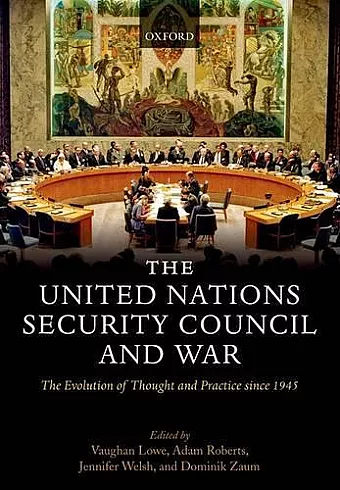The United Nations Security Council and War
The Evolution of Thought and Practice since 1945
Roberts editor Lowe editor Welsh editor Zaum editor
Format:Paperback
Publisher:Oxford University Press
Published:15th Apr '10
Currently unavailable, and unfortunately no date known when it will be back

This is the first major exploration of the United Nations Security Council's part in addressing the problem of war, both civil and international, since 1945. Both during and after the Cold War the Council has acted in a limited and selective manner, and its work has sometimes resulted in failure. It has not been - and was never equipped to be - the centre of a comprehensive system of collective security. However, it remains the body charged with primary responsibility for international peace and security. It offers unique opportunities for international consultation and military collaboration, and for developing legal and normative frameworks. It has played a part in the reduction in the incidence of international war in the period since 1945. This study examines the extent to which the work of the UN Security Council, as it has evolved, has or has not replaced older systems of power politics and practices regarding the use of force. Its starting point is the failure to implement the UN Charter scheme of having combat forces under direct UN command. Instead, the Council has advanced the use of international peacekeeping forces; it has authorized coalitions of states to take military action; and it has developed some unanticipated roles such as the establishment of post-conflict transitional administrations, international criminal tribunals, and anti-terrorism committees. The book, bringing together distinguished scholars and practitioners, draws on the methods of the lawyer, the historian, the student of international relations, and the practitioner. It begins with an introductory overview of the Council's evolving roles and responsibilities. It then discusses specific thematic issues, and through a wide range of case studies examines the scope and limitations of the Council's involvement in war. It offers frank accounts of how belligerents viewed the UN, and how the Council acted and sometimes failed to act. The appendices provide comprehensive information - much of it not previously brought together in this form - of the extraordinary range of the Council's activities. This book is a project of the Oxford Leverhulme Programme on the Changing Character of War.
A definitive interdisciplinary work on an important subject ... The depth of knowledge and experience provides fascinating and essential reading for anyone interested in the area of international peace and security, regardless of their disciplinary background and whether practitioner or academic * Christian Henderson in International and Comparative Law Quarterly *
The United Nations Security Council and War is an essential work, full of astute observations. Set apart by the wealth of ideas and diversity of viewpoints, this edited collection provides a seminal and well-balanced account of the Security Council's dealing with war since 1945. * Robin Geiss in German Yearbook of International Law *
a magnificent achievement... this book will stand out as an indispensable tool in the vast literature on the UN Security Council, set apart by the quality of its research, the wealth of extensive and carefully researched data it contains, as well as the diversity of viewpoints it offers. * Professor Gilles Andréani in Survival *
An incredible achievement, magisterial and definitive. This is an essential work on anyone's bookshelf. * Professor Lawrence Freedman, June 2008 *
this excellent edited collection ... consistently high standard we should not forget that for better or worse the UN can only work well when its Great Powers work together. Analysts and policy-makers alike would be better prepared to bring this about if they read this important new book. * Professor Paul Williams, International Affairs *
This substantial, comprehensive, and authoritative volume contains 28 chapters by leading academics, lawyers, and practitioners, plus detailed appendices covering UN resolutions, sanctions, and operations. * Foreign Affairs, December 2008 *
Overall, the book contains an insightful analysis of the way the SC has been addressing the issue of war...provides an excellent exposition of the political and legal parameters - often translated as constraints - within which the SC operates, and assesses their impact on the SC's action in an un-emotive but perceptive manner * Nikolaos Tsagourias *
ISBN: 9780199583300
Dimensions: 245mm x 172mm x 47mm
Weight: 1354g
816 pages